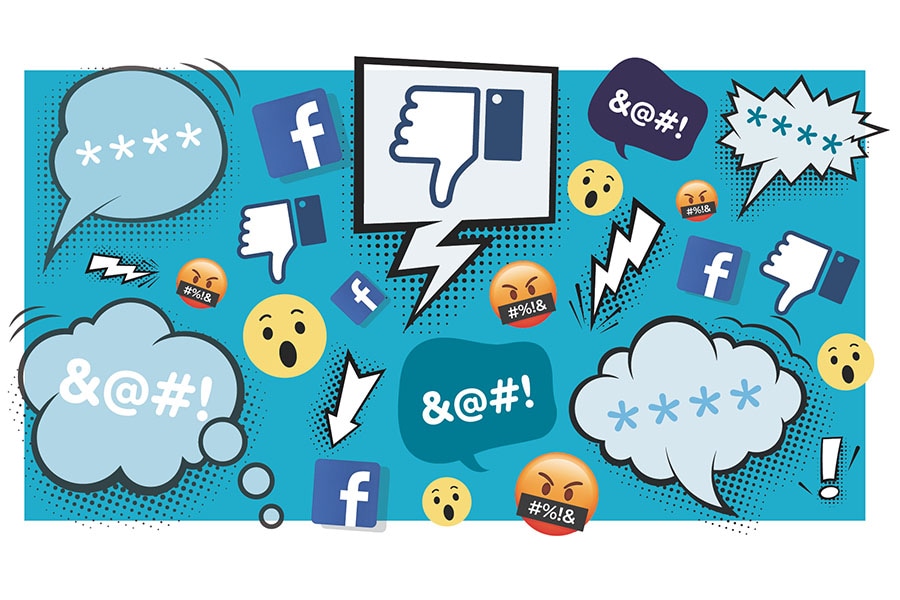
Facebook: Friend or foe to India's democracy?
The social media platform's role is under scrutiny after it reportedly refused to enforce community guidelines for a BJP leader's hate speech post. Its journey in India has been fraught with similar issues over the years
 Illustration: Anjan Das
Illustration: Anjan DasOn September 2, Facebook representatives will appear before a Parliamentary Standing Committee on Information Technology, led by Congress MP Shashi Tharoor, over a hate speech row. An article in The Wall Street Journal claims that the social media giant didn’t enforce restrictions on hate speech on a communal post by T Raja Singh, a member of the BJP, allegedly to prevent falling out of favour with the ruling party.
Founder Mark Zuckerberg said, in a 2019 address at Georgetown University, that in times of social turmoil, "our impulse is often to pull back on free expression. We want the progress that comes from free expression, but not the tension... Pulling back on free expression wasn’t the answer and, in fact, it often ended up hurting the minority views we seek to protect."
Even so, Facebook’s journey in India, its biggest market by far with 290 million users, has been fraught among activists for a while. In 2015, its Free Basics programme met with protests for violating net neutrality, since it would extend special benefits to certain websites. A spate of lynchings following rumours spread via WhatsApp began in 2017 in India’s hinterlands; as recently as April 2020, a vigilante mob lynched two priests and their driver in Maharashtra’s Palghar district over WhatsApp rumours. While Facebook has introduced fact checking and India-specific features for WhatsApp, including restrictions on how many times a message can be forwarded, they have yet to display their effectiveness, and Facebook’s role as a gatekeeper—a debate that’s currently of special relevance in the upcoming US elections—becomes vital to define.
“The Election Commission came out with a voluntary code of conduct after the 2019 elections in India, and as we can see, it has not worked well,” says lawyer Apar Gupta, executive director of the Internet Freedom Foundation. “Facebook also has its own election integrity rules to prevent abuse of the platform. But we have no clear idea of how Facebook is enforcing its rules—there’s a lack of transparency as well as a lack of regulatory oversight. This is troubling because voters today make decisions based on what they read online.”
There have been connections documented between hate speech and elections in India, he adds, specifically how when you vilify hate speech, it leads to a consolidation of religious and casteist identities, and thereby enables political advantages.
“We need a deep dive into every platform, not just Facebook. Governments, citizens and platforms need to work together to address this,” says Pooja Jauhari, CEO of The Glitch, a creative agency that deals with social media branding and advertising. “There are going to always be people on every side of the dialogue, but the basics of hate, racism and violence needs to be eliminated. So many people on the internet are impressionable.”
(This story appears in the 30 November, -0001 issue of Forbes India. To visit our Archives, click here.)








